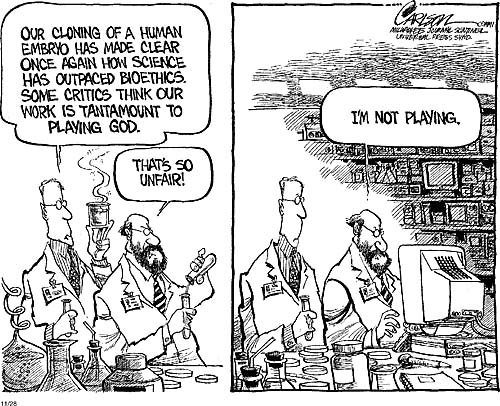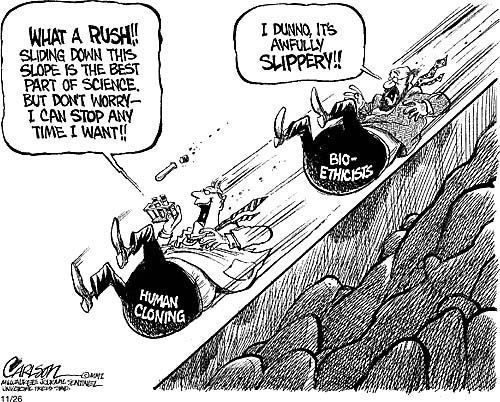
Ethical Issues in Science
Fall Semester, 2002
Instructor:
William A. Price, Ph.D.
Holroyd 307
(215) 951-1261
price@lasalle.edu
This is a course where we will attempt to create an interactive atmosphere for
the discussion and evaluation of a number of scientific issues that seem to
be
challenging some of our basic human values. We will get past the sensational
headlines and carefully evaluate a number of modern scientific issues. Some
of these
issues did not even exist a few years ago and thus we may find ourselves at
the front lines of a controversy.

Texts:
Green, Ronald M., The Human Embryo Research Debates: Bioethics in the Vortex
of Controversy, Oxford University Press, Oxford U.K., 2001.
Peterson, James C., Genetic Turning Points: The Ethics of Human Genetic Intervention,
Wm. B. Eerdmans Publishing Co., Grand Rapids, MI, 2001.
Course Objectives:
Although no formal science background is required, both a scientific curiosity
and a desire to explore complex issues are extremely important. On occasion,
scientific background information will be imparted so that issues can be analyzed
accurately and with a significant level of intelligence.
Ideally, principles such as autonomy, beneficence, confidentiality, justice
(to whom?), veracity, fidelity and nonmaleficence all operate in harmony. More
often than
not, they clash dramatically. We hope to develop an ability to work with issues
that do not necessarily have a “right” answer. Class participation
is absolutely
essential. It is also important to be able to work effectively in small groups
and to listen and respect those with whom you disagree. Since this is a
discussion-oriented class, it is also essential that you critically read all
assigned materials prior to coming to class.
Topics that may be covered:
Basis of ethics, values and impact of culture and religion
Technology
How we do science: misconduct, fraud, and negligence, dissemination of results
Stem cell research
Cloning technologies
Genetic technologies: screening, therapy, Human Genome Project
Reproductive technologies and the impact
AIDS: vaccines, clinical trials, allocation of funds, patents
End of life decisions
Environment: Human influence on global climate change
Evaluation:
1) Weekly Journal and Political Cartoons (20%)- For every Friday, you are to
write an assessment of a recent article from a newspaper or magazine dealing
with a scientific issue that presents an ethical dilemma. Your 1-2 page typed
paper will give an overview of the situation, the ethical dilemma as you see
it, and
your analysis or assessment of the scenario with a well-formulated conclusion.
What additional information do you need? One or two times in the semester, you
will be asked to either evaluate or draw a political cartoon that cleverly depicts
an issue and shows an appreciable depth of knowledge. One or two students
will be randomly selected to share their story or cartoon.
2) Case Studies & Debates (15%)- Occasionally, the class will be presented
with a case study detailing a dilemma resulting from a technological breakthrough.
Analyses of these studies will be evaluated either as oral group presentations,
debates, or papers. The groups will be made up of three to four students. You
may be asked to defend a stance that you do not necessarily agree with.
3) Research Paper (15%) - You will be asked to research and write a 5-7 page
paper on a topic of your choice that is relevant to course objectives. An
abstract detailing your topic with two bibliographic sources (not WWW…)
is due Wednesday, October 9. You may use the World Wide Web for ancillary
sources. The paper is due Friday, October 18.
4) Oral presentation (15%)- In a group of two, you will research and organize
a "lesson" that will take one full lecture period (approximately 25
minutes per
student if you divide up the time). You can be as creative and as interactive
as your group decides. Use of materials other than chalk is strongly encouraged.
I
will interject in the lessons only if misinformation is being disseminated.
Topics that have been successfully presented in the past include: The Human
Genome
Project, radioactivity, Therapeutic cloning, genetic screening in the workplace,
xenotransplantation and genetically modified foods. The groups will meet with
the instructor one week prior to their presentation. The presentations will
take place in November.
5) Midterm (15%) - Friday, October 25.
6) Final Examination (15%)
Binder: (5%)
You will be receiving many readings in this All materials for this course will
be neatly organized in a binder. The sections of the binder will be categorized
as follows:
1) Weekly journal with copy of the first page of the article
2) Case studies with notes from group and class
3) Notes from class (non-case studies)
4) Research and notes and materials from your "lesson plans"
5) Handouts and assigned readings (put date readings were received)
6) Graded papers and assignments (both formal and informal)
The binder will be collected a couple of times throughout the semester so be
sure to bring it to each class.
